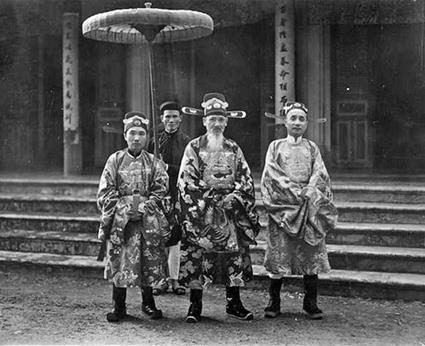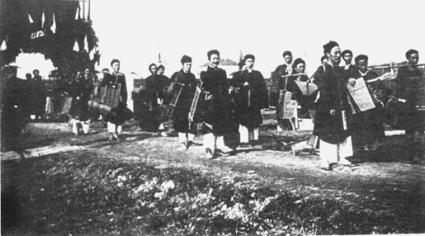Pham Diem
State and Law Institute of Vietnam
The laws of pre-capitalist countries in general and the Vietnamese feudal law in particular were all presented in the form of criminal legal norms. In ancient laws, there was no distinction between criminal and civil laws or between substantive and procedural laws.
A particular and interesting feature of Vietnam’s feudal law is that its feudal dynasties and lawmakers attached great importance to the efficacy of judicial activities. They strived to make regulations on civil relations and procedures conformable to the people’s practical social life and at the same time to minimize numbers of disputes and lawsuits and to ensure prompt and effective settlement of cases. These prominent ethos can be seen in the following aspects:
1. In Vietnam’s ancient law, great importance was given to regulations on civil relations and procedures, which are now called “private law”. Unlike the ancient Chinese law which only paid great attention to “public law” but not “private law,” the Vietnamese feudal lawmakers place importance on both “public law” and “private law”. Under the Ly and Tran dynasties (in the 11th thru 15th centuries), which had two major written codes entitled “Hinh thu” (Penal Code), nearly half of the individual legal documents - the kings’ orders mentioned in history - directly dealt with land ownership, contracts, inheritance, marriage and family and procedures for settling civil cases.
Especially in the Le dynasty’s law (the 15th thru 18th centuries), the Hong Duc Code, the most famous and classical code of Vietnam’s ancient law, had an entire chapter on real and personal estate - the Chapter “Dien san” - with 58 articles, regulating land ownership, contracts, inheritance and procedures, including civil procedures.

century __Photo: nguyenphutrong.net
What is interesting is that the Le dynasty’s legislators compiled a separate procedural code entitled “Quoc Trien Kham Tung Dieu Le” (The National Procedural Regulations of the Royal Dynasty). This type of code was truly rare in foreign laws during the pre-capitalist period.
Generally speaking, matters falling under the “private law” were prescribed by Vietnamese ancient lawmakers in a fairly comprehensive, specific and adequate manner. For example, Article 366 of the Hong Duc Code stated:
“People can make their testaments or deeds by themselves if they know how to write and read, or ask other people to write such things for them, which, however, require certification by local mandarins. If not, they will be beaten 80 times with wooden sticks and be fined, and their testaments or deeds become invalid.”
The lawmakers of the Le dynasty even set different model forms of contract for application nationwide, aiming to create favorable conditions for people to enter into civil contracts or settle civil disputes. These contract forms were systematized and provided in written form.
2. The ancient society in Vietnam was a petty agricultural society in which people were closely bound together by various ties in different community forms, such as village community, clan community and gild community. Being petty peasants, Vietnamese people during the feudal time were heavily influenced by the idea of private ownership and self-interest. Hence, the conflicts of interest between members of a community or between two communities frequently occurred. This led to numerous lawsuits, big and small, which feudal dynasties and lawmakers tried to reduce through the following prominent procedural measures:
First, the procedural jurisdiction at different levels was clearly and specifically defined. Accordingly, village administrations had to immediately settle trifling cases newly arising in localities, mainly through conciliation. Under a regulation promulgated in 1665, trifling cases included quarrels, minor burglaries and thefts, and disputes over property of small value. In the spirit of that document, when handling cases under their jurisdiction, village chiefs played a key role in conciliating the parties concerned by all means in order to put an immediate end to these cases.
As in villages and communes then trivial disputes were daily occurrences, the above regulation was of great practical significance, helping settle right at the grassroots level complaints and petitions, minimize the number of lawsuits which were costly for the State and people and ease the juridical burden for superior mandarins.
This spirit was also perpetuated by the Nguyen dynasty’s lawmakers in the Gia Long Code of the 19th century. Conciliation was also carried out at higher levels, aiming to reduce or stop prolonged lawsuits.
That guiding principle was lively expressed in a decree of the Le dynasty:
“Mandarins must pay heed to the education of commoners to abide by the moral principles under which the fathers must be kind; children must be dutiful; elder brothers must be generous; younger brothers must express respectful gratitude; wives must have regard for their husbands; children and grandchildren must respect the family elders. Waywardness and impertinence, undutifulness, hooliganism and adultery must be punished by whipping in order to maintain the benevolence and rightness as well as civility and to do away with denunciations and reduce lawsuits. For cases in which people file lawsuits only for anger and disappointment or have disputes only for trivial reasons, mandarins shall dissuade and conciliate them. For big cases related to marriage and family, real estate or human lives, etc., local mandarins must examine and handle them carefully. If people deliberately file lawsuits with higher-level authorities, though they have been dissuaded and their cases have been already settled, superior mandarins shall explain and reconcile them so that the plaintiffs listen to reason and submit themselves to orders. That is the way to reduce lawsuits.”1
Second, the State clearly defined the responsibilities of judging mandarins and involved parties.
With regard to judging mandarins, the Hong Duc Code stated that they could only accept valid petitions in accordance with their adjudicating jurisdiction. If past one month, they still failed to adjudicate a case, they would be sentenced to “biem” (professional and moral rank demotion). If past three months, they would be subject to dismissal, and if past five months, they would be punished with “do” (hard labor).
The following provisions on the involved parties can also be found in the ancient law:
- If filing wrongful lawsuits, slandering other people, they would be sentenced for slander.
- When filing lawsuits, small or big, or with whatever level, they must pay a fee, which varies depending on the types of their cases and the levels they file their lawsuits with, but is often fairly large. This provision makes people cautious before filing their lawsuits.
- If the plaintiffs call for appellate trial and the courts of appeal decide that their cases were properly settled at the first-instance trial, they would be subject to a “forgiveness-asking” fine, which may be small or large depending on their small or big cases and on the rank of the judging mandarins.
This measure also aims to caution the parties involved when filing appeals, thus preventing prolonged lawsuits.
Even the “Quoc Trieu Kham Tung Dieu Le” provided that a case which had been already adjudicated with similar results at three levels must not be further appealed by the plaintiff.
Third, the State attached importance to the control of adjudication by mandarins at all levels.
The inspection and control of adjudication by mandarins at all levels, referred to in the ancient law as “soat tung”, also received great attention of feudal lawmakers with a view to preventing delayed trial and reducing unjust adjudication.
“Soat tung” was fully and specifically defined in Chapter “Thong le ve kham tung” (Procedural Practices) and Chapter “Le soat tung” (Provisions on Adjudication Control) of “Quoc Trieu Kham Tung Dieu Le.” That was an effective and efficient control mechanism, under which superior mandarins control adjudications by subordinate mandarins, “tri phu” (provincial chiefs) inspect “tri huyen” (district chiefs), “hien ty” (mandarins in charge of supervising all local affairs) inspect “tri phu,” etc.
Adjudication control was conducted in two forms. The first one was adjudication control of a case via review trial when a judgment was appealed. If the judging mandarin properly adjudicated the case, he was entitled to the forgiveness-asking sum paid by the involved party. If he handed out an unjust sentence, he was fined by superior mandarins and possibly subject to demotion or dismissal.
The other form was annual adjudication control. At the end of a year, mandarins at all levels must declare cases they have adjudicated and cases left unhandled, the number of cases with correct judgments, for which they have enjoyed forgiveness-asking sums, and the number of cases with unjust sentences, for which they have paid fines. Superior mandarins would base themselves on the forgiveness-asking sums and the fines to assess the capability and performance of their subordinates. The superior mandarin would give his comment by writing the word “thuong” (plus) if the total of forgiveness-asking sums is larger than the total of fines, or the word “ha” (minus) if the total of forgiveness-asking sums is smaller than total of fines, on which the royal court can base to commend or penalize the judging mandarins.
Generally, all feudal dynasties in Vietnam considered judicial activities one of the important functions of the feudal state and mandarins at all levels, regarding the performance of these activities as a basic ground for assessment, commendation, punishment, demotion or promotion of mandarins. In the eyes of commoners, the adjudication by mandarins was a thermometer of the virtue and talent of mandarins as well as the prestige of the rulers.-

